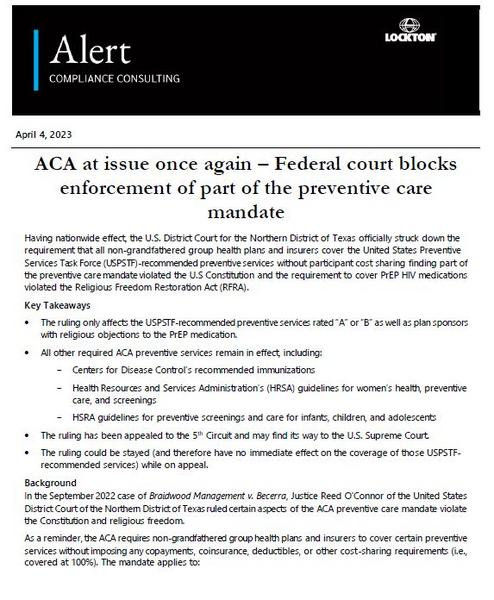Having nationwide effect, the U.S. District Court for the Northern District of Texas officially struck down the requirement that all non-grandfathered group health plans and insurers cover the United States Preventive Services Task Force (USPSTF)-recommended preventive services without participant cost sharing determining the coverage requirement related to those specific services violated the U.S Constitution and the requirement to cover PrEP HIV medications violated the Religious Freedom Restoration Act (RFRA).
Key Takeaways
The ruling only affects the USPSTF-recommended preventive services rated “A” or “B” as well as plan sponsors with religious objections to the PrEP medication.
All other required ACA preventive services remain in effect, including:
Centers for Disease Control’s recommended immunizations.
Health Resources and Services Administration’s (HRSA) guidelines for women’s health, preventive care, and screenings.
HSRA guidelines for preventive screenings and care for infants, children, and adolescents.
The ruling has been appealed to the 5th Circuit and may find its way to the U.S. Supreme Court.
The ruling could be stayed (and therefore have no immediate effect on the coverage of those USPSTF-recommended services) while on appeal.
Background
In the September 2022 case of Braidwood Management v. Becerra, Justice Reed O'Connor of the United States District Court of the Northern District of Texas ruled certain aspects of the ACA preventive care mandate violate the Constitution and religious freedom.
As a reminder, the ACA requires non-grandfathered group health plans and insurers to cover certain preventive services without imposing any copayments, coinsurance, deductibles, or other cost-sharing requirements (i.e., covered at 100%). The mandate applies to:
USPSTF-recommended preventive services rated “A” or “B”.
Centers for Disease Control and Prevention Advisory Committee on Immunization Practices (ACIP) recommended immunizations.
Preventive care and screenings for women are provided for in the HRSA guidelines; and
Preventive screenings and care for infants, children, and adolescents are provided for in the HSRA guidelines.
Justice O’Connor concluded the preventive care recommendations made by the USPSTF, which become binding under the ACA as covered preventive care subject to the first dollar coverage rule, violates the U.S. Constitution’s Appointment Clause as the USPSTF is a volunteer panel not appointed by the President or confirmed by the Senate. O’Connor went on to find that mandating employers cover PrEP, an HIV drug regimen that qualifies as an ACA preventive service, violates the RFRA.
Lockton Comment: Justice O’Connor’s ruling upheld certain parts of the ACA preventive care mandate including recommendations by the HRSA related to women, children, and adolescents and recommendations by the ACIP, meaning the recommendations of these organizations would still be covered by non-grandfathered plans and insurers with no cost-sharing requirements.
At the time of the ruling no remedy was offered, instead, the Court asked for both parties to provide additional briefings as to a remedy. And now, here we are.
A nationwide injunction in play
This week Justice O'Connor issued a nationwide injunction blocking enforcement of those applicable provisions of the ACA preventive mandate determined to be unconstitutional in his September ruling, specifically those USPSTF recommendations with “A” or “B” ratings on or after March 23, 2010, and coverage of PrEP HIV medications.
Keep in mind, the injunction does not impact preventive care recommendations made by the HRSA or ACIP, meaning those preventive care services are still required to be covered in accordance with ACA requirements.
The decision was quickly appealed by the Biden Administration.
What does this mean for employer-sponsored benefit plans?
The injunction will not likely have any immediate impact on employers with fully insured plans as those policies are approved by the state andthe terms of the state-approved policy are likely locked until the following renewal period. Additionally, those fully insured policies may be subject to certain state preventive care mandate requirements.
For employers with self-insured group health plans, the injunction would allow employers the option to amend their plans to make changes, including implementing cost-sharing for those USPSTF-recommended preventive care services impacted by the decision.
Lockton Comment: Practically speaking, employers may not have the appetite to make midyear changes to their benefit plan, potentially fielding questions, and concerns from employees regarding coverage of preventive care. Additionally, if the ruling is reversed on appeal and/or the Administration requests a stay of the decision until the appeal, the plan may need to be amended again.
It’s also unclear how quickly carriers and third-party administrators can update their claims processing systems to modify the list of preventive services and apply cost-sharing to those services to which the injunction applies while still covering the remaining preventive care requirements without cost-sharing in accordance with the ACA mandate.
Those employers that opt to amend their plans midyear will need to provide notice of those plan changes in advance of the effective date, 60 days advance notice to be exact since preventive care cost-sharing information is reflected in a plan’s Summary of Benefits and Coverage (opens a new window). Employers who choose to make changes in line with the start of the new plan year can communicate those changes as part of the annual open enrollment.
Lockton Comment: There are questions surrounding the impact of the decision on health savings accounts (HSAs). Specifically, if an employer continues to provide the USPSTF-recommended preventive services without cost-sharing will that first-dollar coverage of USPSTF-recommended preventive services render individuals ineligible to contribute to an HSA. Entities are already contacting the Department of Treasury and the IRS to encourage flexibility with HSAs and to request confirmation that the USPSTF-recommended services are still deemed preventive care under the HSA rules which have traditionally been more expansive in their definition of preventive care than the ACA, allowing first dollar coverage without impacting participant HSA eligibility.
In sum, this issue is far from over as appeals are ongoing. If you should have questions or clarifications, please reach out to your Lockton account team. Download article (opens a new window)
Download article (opens a new window)

